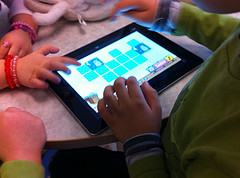01 Apr Generation Y Wants Anonymity Online. Homelanders Will Demand it
They play iPad games during potty training. They learn computer coding before they can read. Their mothers’ smartphones become their first object of jealousy. Their sonograms are shared with the world before they see the light of day. In fact they are born into a digital panopticon that will track their every movement, every milestone and every toy purchase for all eternity.
Sherry Turkle, MIT’s famed “digital psychologist”, reports that parents’ cell phone habits pose serious threats to the parent-child bond as children feel deep jealousy to these devices and the attention deprivation they cause. Critical probing suggests that young people might be reacting to dismantling privacy rights by adopting even more careful internet behaviors themselves, but this fact is often scoffed aside. The logic goes, internet transparency is the new normal, so kids are used to it and don’t care as much about privacy. It’s the new a priori conditions that will quell any urges to rebel against this omniscient evil called the internet (or Google). If that were true our human need for privacy is only environmentally conditioned. It might make sense on the surface, but do we have any empirical support for that idea? Hardly. If anything, the yearning for privacy and autonomy over ones own life and reputation has inspired some of our most reverberating literature over the years (Orwell’s 1984). Psychologists have long debunked the myths that claim that all types teenage bashfulness is learned, not innate.
This is why:
- Sharenting. This new word was coined just as the virtual ink dried on my first article on this phenomenon. “Sharenting” is the confluence of two (or three) contemporary trends: the technological ease of sharing (social media, smart phones with cameras) combined with today’s over-vigilant parenting styles. Some will also throw narcissism into that equation.
- From FOMO to JOMO. Instabrag and Fakebook keep their users perpetually chasing after the unachievable perfection of their friends. The allure of the better parties, the nicer houses, the more bliss, the more successful careers, the perfect health and constant updates on accomplishments can leave strong feelings of inadequacy, even depression. The youngest generation growing up today is particularly vulnerable as they often face fewer economic opportunities than their parents had. Until now FOMO, the Fear Of Missing Out – has been a great source of stress, but this is changing. JOMO, or the Joy Of Missing Out lets teens unplug and unwind– with their social status still intact.
- “The Snowden Effect”. While all generations have improved their use of privacy settings, the greatest increase is recorded in the younger generations. Whereas only 11% of internet users between 18 and 44 have never changed their privacy settings as many as 45% forego privacy settings in the older cohorts. The generation born right after the onset of social media is likely to voice a strong urge to protect the remaining privacy of themselves and their future children.
Teens do care about online privacy and we can expect that this orientation will become even more explicit as the post-millennials or Generation Z come of age in the next decade.



Sorry, the comment form is closed at this time.